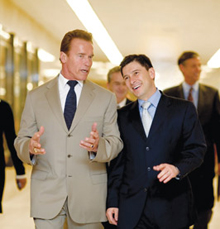home | metro silicon valley index | news | silicon valley | news article

s76, ZUMA Press
Terms of endearment: Neither Gov. Schwarzenegger (left) nor this animatronic replicant of Assembly Speaker Fabian Nunez (right) are ready to back down from a Sacramento showdown over term limits and redistricting.
Pushing the Limits
Pax Sacramento is about to come crashing down in a political tug-of-war over defeat-proof districts
By Paul Wagner
CALIFORNIA politics might appear sunny at the moment, with Gov. Arnold Schwarzenegger buddying up with Assembly Speaker Fabian Nuñez for family dinners and touring the country as the nation's pre-eminent post-partisan and global-warming governor.
But dark clouds are gathering. The sources of the storm? There are two: a dispute over whether state legislators will be able to serve additional terms; and a struggle over whether the hand-drawn, dinosaur-shaped districts the two major political parties designed in 2001 to deliver defeat-proof elections will survive.
In short, term limits and redistricting. Which are now, thanks to intense political jockeying, conjoined.
Why? Because if term limits aren't modified, nearly every experienced California legislator, from Nuñez to the 27th District's own highly esteemed Assemblymember John Laird, will be termed out of office in either 2008 or 2010. They want more time.
But Schwarzenegger has signaled that he'll support term limits loosening only if he gets a redrawing of districts. Not only statewide legislative ones, but congressional—which differ slightly in boundaries—as well. That's redistricting that voters have already repeatedly turned down, most recently in November of 2004.
And the sides are digging in. On June 26, all 19 Republican members of the House sent Schwarzenegger a letter demanding that all California congressional districts be redrawn as part of any deal. That in turn set off House Speaker Nancy Pelosi, who, freshly triumphant from 34 hard-fought statewide Democratic congressional victories, wants things to remain as they are.
Thus the battle has taken on national proportions, with even editorialists of the Washington Post and USA Today weighing in. And national groups have not been able to resist getting involved.
Conservative Virginia-based group U.S. Term Limits sued Attorney General Jerry Brown over ballot summary language he'd written for a term-limits-loosening measure now being circulated statewide for February's primary ballot. Sacramento County Superior Court Judge Gail Ohanesian ruled against USTL on May 25, writing "I may well have written this ballot title and summary differently" but declaring that Brown's language was "not false or misleading." USTL, which took the case to the Court of Appeals, lost there on June 29 and says it's throwing in the towel. And the language seems to be working for the issue: San Jose State's survey organization released a poll on June 26 showing likely voters favoring looser limits 56 percent to 28 percent.
Meanwhile, an arm of USTL has taken on another terms-extension proponent, state Senate President Don Perata, filing a complaint with the California Fair Political Practices Commission over how he's been spending his approximately $1 million campaign war chest.
Compounding these challenges are questionable charges from the left that the campaign is compromising its legislative goals.
The assembly's public safety committee, for example, appeared ready last week to approve a bill opening police officers' discipline records to public scrutiny statewide, when the bill—already approved by the state Senate—suddenly died.
It turns out that just prior, Police Officers' Association president John Sites had emailed legislators stating that police "adamantly oppose this legislation" and that "if it is passed, we will move quickly to oppose any term limit reform." The L.A. Times immediately characterized the police's action as "union thuggery" and assemblymembers' response as "cowardice."
Then there's the incident this month in which Nuñez, a former labor organizer, quietly gave up his longstanding demand that Indian casinos put in writing guaranteed neutrality toward union organizers in newly approved facilities, settling for verbal guarantees. Jack Gribbon of hotel workers union UNITE-HERE declared the group "outraged," and threatened to sponsor a ballot measure asking its members to both overturn the new gaming agreements and oppose any term-loosening measure as well.
Meanwhile, on the other side of the deal, four redistricting-related bills—two in the Assembly and two in the state Senate—have survived committee hearings, but differ significantly in content. Laird says it's an "open question" whether a package will be hammered together by Sept. 27, the last date for anyone to qualify initiatives for the Feb. 5 primary.
"Everyone's trying to get the budget finished so we can move on to health care, which we actually might accomplish this year, and then come other matters," Laird says. On the other hand, pointing out that "we're not due to go out of session until Sept. 14," Laird sees plenty of time to put together a redistricting initiative.
And what of suspicions that politicos want loosened term limits badly enough to change votes? "Well, they would be nice, but I'm not going to do something I wouldn't otherwise do, like suddenly support costly new dams in the Central Valley," he says. "No one's going to sell their souls for this."
Send a letter to the editor about this story.
|
|
|
|
|
|